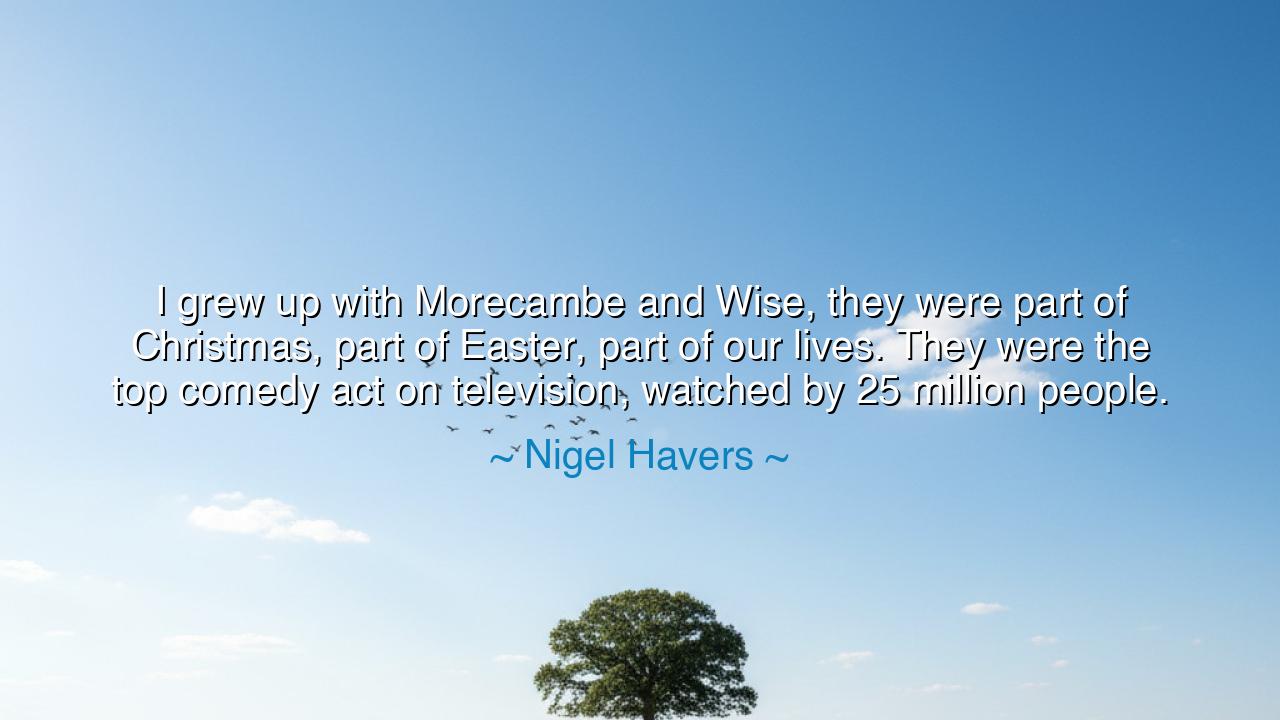
I grew up with Morecambe and Wise, they were part of Christmas
I grew up with Morecambe and Wise, they were part of Christmas, part of Easter, part of our lives. They were the top comedy act on television, watched by 25 million people.






In the nostalgic words of Nigel Havers, we hear not simply the remembrance of a television era, but the echo of a time when laughter united a people. “I grew up with Morecambe and Wise, they were part of Christmas, part of Easter, part of our lives. They were the top comedy act on television, watched by 25 million people.” These are not the casual words of admiration, but the reverent tones of one who recalls the days when joy was shared, when entire nations gathered not in conflict or noise, but in a single moment of mirth. Havers speaks here as a son of a culture that found its reflection in humor, its comfort in togetherness, and its heart in the light of two men who made the world, for a time, feel smaller, warmer, and kinder.
To understand the origin of this quote, we must journey back to mid-20th century Britain — an age scarred by war but striving for rebirth, a time when television had become a hearth for the modern family. It was in that age that Eric Morecambe and Ernie Wise, two comedians of unmatched chemistry, rose to prominence. Their Christmas specials were not mere entertainment; they were rituals of joy, moments that transcended class, creed, and generation. On those nights, streets grew quiet, families gathered, and the laughter that erupted from living rooms became the heartbeat of a nation rediscovering its happiness. In the midst of gray winters, Morecambe and Wise gave Britain color; in a world still uncertain of its future, they offered the certainty of laughter.
Nigel Havers, born into that era, speaks for an entire generation who found in those moments something eternal — not simply comedy, but connection. His words remind us that laughter, when shared across millions, becomes a kind of collective prayer. For laughter, like faith, binds the human spirit to hope. When he says they were part of “Christmas” and “Easter,” he does not mean they were sacred in the religious sense, but that they became woven into the rhythm of the nation’s soul — part of its ritual calendar, part of the collective memory of what it meant to belong. Their presence became tradition; their absence, unthinkable.
The ancients too understood the sanctity of joy. In the theaters of Athens, the comedies of Aristophanes served not only to amuse, but to heal a weary people after war. Laughter was seen as divine medicine, a sacred gift that restored perspective and balance to the human heart. In this same way, Morecambe and Wise became modern healers of the spirit, lifting the burdens of daily toil through wit and warmth. When Havers remembers them, he is not recalling just a television act — he is recalling the power of art to unite humanity, to bring light to the darkest of times through the simplest of human acts: the sharing of a smile.
The meaning of Havers’s reflection runs deeper than nostalgia. It speaks to the loss of common experience in the modern age. Once, millions could laugh together at the same hour, their hearts beating in rhythm through shared delight. Today, in an age of endless channels and isolated screens, such unity feels distant. The laughter of the crowd has become the chuckle of the individual. Havers’s words, then, are both a remembrance and a warning — a call to cherish what connects us, to seek out not only what entertains, but what binds. For in a fragmented world, the power of shared joy becomes an act of restoration.
Consider the story of Charlie Chaplin, who in the silence of his films spoke to the whole world without words. His humor crossed nations, languages, and wounds left by war. Like Morecambe and Wise, he reminded mankind that to laugh together is to remember that we are one people, capable of kindness, grace, and forgiveness. Every great comedian, in truth, is a philosopher in disguise — one who teaches, through laughter, the humility and tenderness of being human. When Havers recalls his childhood heroes, he is acknowledging not only what they made him feel, but what they taught him to be: open, joyful, connected.
The lesson we may draw from Nigel Havers’s words is simple yet profound: cherish the things that bring people together. Whether it be through humor, song, or shared ritual, seek always to build communion, not division. Laughter, when shared, becomes a bridge across generations, a light that endures even when the world grows dark. In your own life, do not let joy be solitary; make it communal. Gather your loved ones, tell your stories, watch something that makes you all laugh until tears fall. For in that moment, you will have touched something eternal — the same spirit that bound 25 million souls before the glow of a single screen.
And so, let us honor the truth that Havers unknowingly speaks for all ages: that laughter is sacred, that the artists who give it are our healers, and that the memories forged through shared joy are the very foundation of civilization. For though times change and heroes fade, the light they leave behind — the laughter that once echoed across a nation — remains the truest measure of our humanity.






AAdministratorAdministrator
Welcome, honored guests. Please leave a comment, we will respond soon